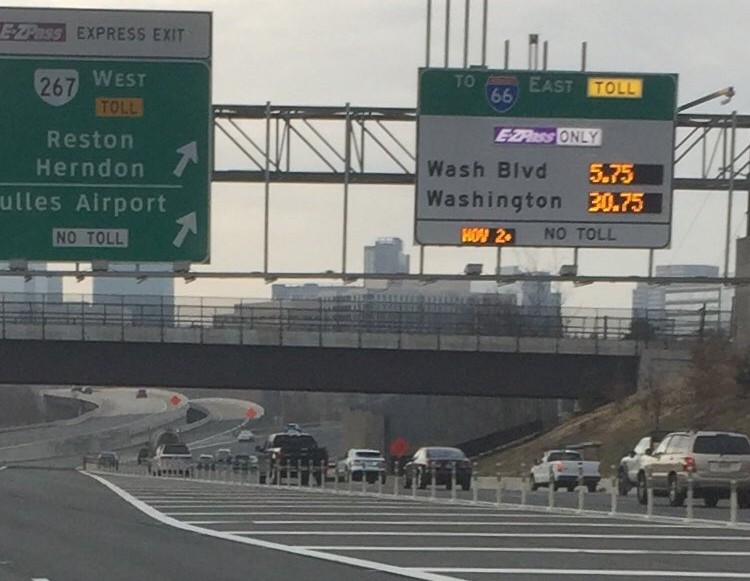This week in northern Virginia, the congested stretch of I-66 inside the Beltway opened to solo drivers during the morning rush, for a price.
Previously, during peak hours these 10 miles of I-66 had been limited to carpoolers, people with hybrid vehicles, and people heading to Dulles Airport. The new policy lets carpoolers use the road for free, while solo drivers pay a toll. This allowed solo drivers to use I-66 at a time when they'd previously been banned, but they were surprised to see rush hour prices ranging between $30 and $40.
The rates are well above the $6 tolls officials had told people to anticipate. But that's what it costs to allow access to single-occupancy vehicles without jamming the road. By law, toll prices are automatically set to keep traffic moving at 55 mph. The high rates reflect high demand (though there's speculation that the prices are being calibrated higher than they need to be).
David Alpert at Greater Greater Washington writes that this whole experience is instructive, because it's one of the few cases where solo drivers have to confront the full cost of their trips. There are lessons for other road projects, he says:
The real reason there's sticker shock is that the real cost of road transportation is hidden from most voters. Gas tax money goes to states and the US Department of Transportation which flows back as what seems like free federal money to build a lot of roads. Meanwhile, every transit project has to scrimp for funds and deal with constant sniping from critics calling it a "boondoggle."
I-66 inside the Beltway is already built and not adding new capacity, but Virginia is adding lanes outside the Beltway under a public-private partnership, and Governor Larry Hogan has proposed the same for nearly every Maryland highway. That's a really expensive proposition, and he'd prefer to make it sound cheap. But Ben Ross estimated that tolls would have to be at least $41 to pay off the costs of construction.
I haven't seen a lot of people citing Ross's numbers, but they should. After this experience in Virginia, that might be low!
Loudoun supervisor Matt LeTourneau pointed out on the Kojo Nnamdi Show that Virginia lawmakers might have made different decisions about the I-66 project had they known. For instance, the project cost $120 million, he said; maybe they wouldn't have spent that kind of money. Perhaps this can be a cautionary tale for Maryland, to at least go into any widening and tolling with its eyes open (or eschew the idea).
The region doesn't have to build expensive road projects that will either result in high tolls or large subsidies to drivers, Alpert points out. Smarter land use planning and investments in transit can create a better transportation system at lower cost.
More recommended reading today: Smart Growth America sounds the alarm about provisions of the GOP tax bill that will hurt cities and undermine housing affordability. And Buffalo Rising writes that after refusing to install bike lanes on Main Street, the city of Buffalo inadvertently proved that they would work fine, by closing a lane for construction.






